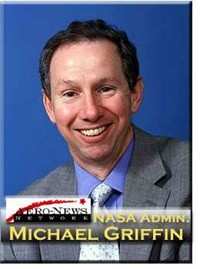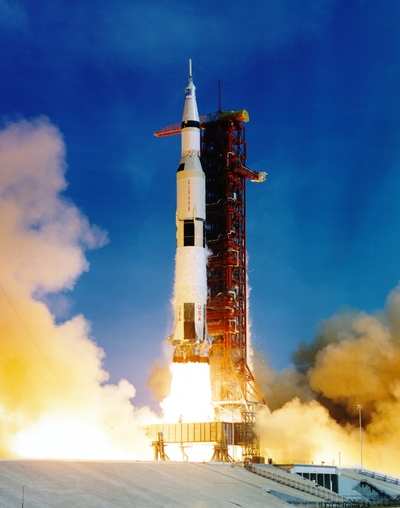Says China Will Probably Beat US To The Moon
 It's not exactly what
"The Right Stuff" was made of, over 45 years ago... but current
NASA Administrator Michael Griffin is taking a more pragmatic,
albeit far less inspiring, approach to America's presence in
space.
It's not exactly what
"The Right Stuff" was made of, over 45 years ago... but current
NASA Administrator Michael Griffin is taking a more pragmatic,
albeit far less inspiring, approach to America's presence in
space.
In a recent interview with the Houston Chronicle, Griffin admits
it's likely China will beat the US back to the moon. Furthermore,
he's fine with that, really... so long as the agency has clear
priorities -- such as completing the International Space Station --
and a stable funding stream to accomplish them.
"I will raise my hand and say I do not want another space race,"
Griffin asserted, when asked whether it bothered him that China, or
India, could reach the lunar surface before NASA returns there.
"What happens when you do that is, you tend to get a short period
of intense funding, and then the attention goes away, funding
dissipates, and it's like an army dealing with a retreat. The
hardest thing to do in military circles is to manage an effective
retreat.
"What I want for NASA is stable and predictable funding and a
stable set of goals," he continued. "Finish the station, retire the
shuttle, return to the moon, go to Mars. Those are great goals for
the next 50 years. I certainly wouldn't mind a higher level of
funding, but the stability of funding is more important than the
absolute level."
In a statement likely to raise a few eyebrows among the storied
ranks of the Apollo spacefarers, Griffin then states the race to
the moon in the 1960s may not have been the best thing for NASA, in
the long run.
"What the Apollo engineers did was one of the miracles of human
accomplishment," he told the Chronicle. "But I could make a pretty
good case for you that, for the long-term mastery of spaceflight by
our nation as a strategic capability, Apollo did more damage than
good. We built up an industrial base, we built up a set of
expectations, we accomplished one of the most marvelous things
that's ever been done, and then we dismantled it all. It brings to
mind the fable of the tortoise and the hare."
(Editor's Note: It's worth noting critics
of the space shuttle program -- and NASA's focus on low-earth orbit
manned missions for the past 30 years -- say much the same things
about NASA's more recent priorities.)
Griffin compares NASA's current mission -- and the questions
posed by it -- to the decision posed by American lawmakers in the
19th century, as they faced the question of sending pioneers out to
conquer the New Frontier.
"I'd like to see answered the policy question for the United
States of what role do we want to have in putting life [in space,]"
Griffin says. "Human beings are confined to the Earth today. For a
very long time, we're going to be confined to the solar system.
What use do we want to make of it in human affairs?

"That was exactly the question, on a smaller scale, facing the
people in Congress in the 1830s. They had purchased enormous tracts
in the American West, and they had been briefly and barely
explored. You had influential politicians standing on the floor of
Congress saying the American West was forever unusable because it
was arid and dry and of no conceivable value to human beings, so
why are we spending money on military expeditions into the
West?
"Probably most people in Houston today would not view that as a
particularly far-sighted set of comments," Griffin admits. "So we
need to decide what role the United States is going to play in
putting life out there."
From the sound of it... a rather limited one...
 NTSB Final Report: Rutan Long-EZ
NTSB Final Report: Rutan Long-EZ ANN FAQ: Turn On Post Notifications
ANN FAQ: Turn On Post Notifications Classic Aero-TV: ICAS Perspectives - Advice for New Air Show Performers
Classic Aero-TV: ICAS Perspectives - Advice for New Air Show Performers ANN's Daily Aero-Linx (06.28.25)
ANN's Daily Aero-Linx (06.28.25) Aero-News: Quote of the Day (06.28.25)
Aero-News: Quote of the Day (06.28.25)




